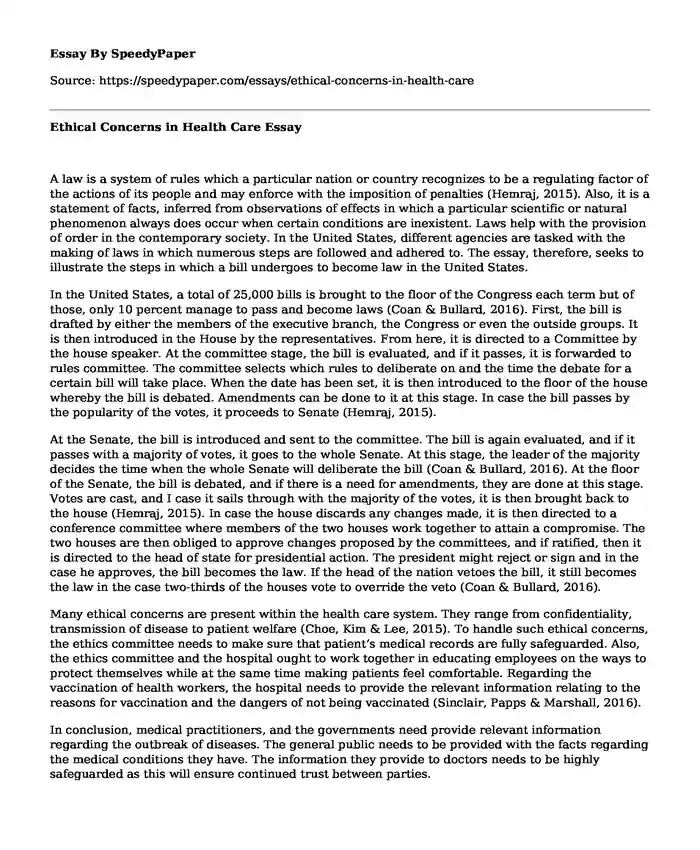
| Type of paper: | Essay |
| Categories: | Company Health and Social Care United States Business |
| Pages: | 3 |
| Wordcount: | 711 words |
A law is a system of rules which a particular nation or country recognizes to be a regulating factor of the actions of its people and may enforce with the imposition of penalties (Hemraj, 2015). Also, it is a statement of facts, inferred from observations of effects in which a particular scientific or natural phenomenon always does occur when certain conditions are inexistent. Laws help with the provision of order in the contemporary society. In the United States, different agencies are tasked with the making of laws in which numerous steps are followed and adhered to. The essay, therefore, seeks to illustrate the steps in which a bill undergoes to become law in the United States.
In the United States, a total of 25,000 bills is brought to the floor of the Congress each term but of those, only 10 percent manage to pass and become laws (Coan & Bullard, 2016). First, the bill is drafted by either the members of the executive branch, the Congress or even the outside groups. It is then introduced in the House by the representatives. From here, it is directed to a Committee by the house speaker. At the committee stage, the bill is evaluated, and if it passes, it is forwarded to rules committee. The committee selects which rules to deliberate on and the time the debate for a certain bill will take place. When the date has been set, it is then introduced to the floor of the house whereby the bill is debated. Amendments can be done to it at this stage. In case the bill passes by the popularity of the votes, it proceeds to Senate (Hemraj, 2015).
At the Senate, the bill is introduced and sent to the committee. The bill is again evaluated, and if it passes with a majority of votes, it goes to the whole Senate. At this stage, the leader of the majority decides the time when the whole Senate will deliberate the bill (Coan & Bullard, 2016). At the floor of the Senate, the bill is debated, and if there is a need for amendments, they are done at this stage. Votes are cast, and I case it sails through with the majority of the votes, it is then brought back to the house (Hemraj, 2015). In case the house discards any changes made, it is then directed to a conference committee where members of the two houses work together to attain a compromise. The two houses are then obliged to approve changes proposed by the committees, and if ratified, then it is directed to the head of state for presidential action. The president might reject or sign and in the case he approves, the bill becomes the law. If the head of the nation vetoes the bill, it still becomes the law in the case two-thirds of the houses vote to override the veto (Coan & Bullard, 2016).
Many ethical concerns are present within the health care system. They range from confidentiality, transmission of disease to patient welfare (Choe, Kim & Lee, 2015). To handle such ethical concerns, the ethics committee needs to make sure that patient's medical records are fully safeguarded. Also, the ethics committee and the hospital ought to work together in educating employees on the ways to protect themselves while at the same time making patients feel comfortable. Regarding the vaccination of health workers, the hospital needs to provide the relevant information relating to the reasons for vaccination and the dangers of not being vaccinated (Sinclair, Papps & Marshall, 2016).
In conclusion, medical practitioners, and the governments need provide relevant information regarding the outbreak of diseases. The general public needs to be provided with the facts regarding the medical conditions they have. The information they provide to doctors needs to be highly safeguarded as this will ensure continued trust between parties.
References
Choe, K., Kim, K., & Lee, K. (2015). Ethical concerns of visiting nurses caring for older people in the community. Nursing Ethics, 22(6), 700-710.Coan, A., & Bullard, N. (2016). Judicial Capacity and Executive Power. Virginia Law Review, 102(3), 765-831.
Hemraj, M. B. (2015). The Judges' Decision-making Process in US Corporate Law: An Insight. International Company & Commercial Law Review, 26(10), 316.Sinclair, J., Papps, E., & Marshall, B. (2016). Nursing students' experiences of ethical issues in clinical practice: A New Zealand study. Nurse Education in Practice, 171-7.
Cite this page
Ethical Concerns in Health Care. (2019, Oct 15). Retrieved from https://speedypaper.net/essays/ethical-concerns-in-health-care
Request Removal
If you are the original author of this essay and no longer wish to have it published on the SpeedyPaper website, please click below to request its removal:
- Public Health Essay Sample on Immigrant Health Issues: Ethical Dilemma
- Free Essay: A Case Study on Integrating ESL Students into the Mainstream Curriculum
- Free Essay on Changes in Business Management
- Law Essay Example: Compare UK Courts and DIFC Courts
- Close Betrayal - Free Essay Describing Personal Experience
- Marketing Management - Vlog Script, Free Paper Sample for You
- HRM Essay Sample: Main Themes in Human Resource Development
Popular categories




